Pubs: Are ball pools and games the future for boozers?
- Published

Jumping into a ball pit is the main attraction at Ballie Ballerson
If you thought jumping into a pit filled with plastic balls was the strict preserve of the under-10s, think again.
An adults-only version, Ballie Ballerson, is the latest innovation to hit Cardiff city centre's pubs and clubs zone.
It is another step on a path towards so-called participation pubs, where the activity is the main event, and drinking is a by-product.
Ballie Ballerson joins other venues such as Flight Club, Porter's, Tonight Josephine, NQ64 and Lane7 - all modern aimed at the Gen Z crowd - in the scramble to keep pubs relevant.
With two pubs a day in Wales and England closing, does this mean traditional boozers are being consigned to history?

Mali Watkins says she prefers modern pubs as they give something "a little bit different" to her nights out
Mali Watkins, 20 from Merthyr Tydfil said although she loves a good night out in her home pub she does prefer going to the fancier, more modern looking ones.
She said: "I just feel like they give something a bit different to your usual night out.
"I have been going the regular pubs for a while so when a new one does comes to Cardiff I'm always very eager to try it out.
"Most of the pubs in my hometown are quite old fashioned and are usually full of older men. That can be quite daunting for me as a young girl sometimes.
"Whereas when I go to the newer, more modern ones - like Flight Club - they are always filled with young people and are just a bit friendlier. Even things like the music and drinks choice can be better sometimes."
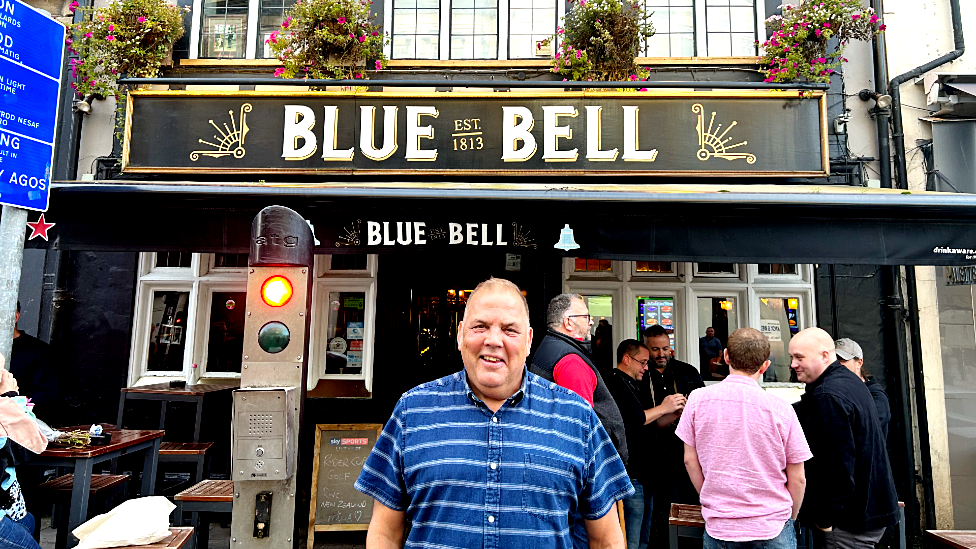
Nick Newman runs the Blue Bell, which has sat on Cardiff's High Street for more than 200 years
Nick Newman, landlord of the Blue Bell in St Mary Street, Cardiff, and chairman of the Cardiff Licensees Forum, has worked in the city centre for more than 40 years and has seen many changes.
When he started out in the 1980s, pubs could only open from 11:00-15:00 and again from 17:00 to 23:30.
Along with the liberalisation of licensing laws in 2003, there has been a social revolution.
The days of large, male-dominated heavy industry are mostly gone, many more women work full-time and the rising costs of going out have all had an impact, as has the proliferation of online socialising and less drinking among the young.
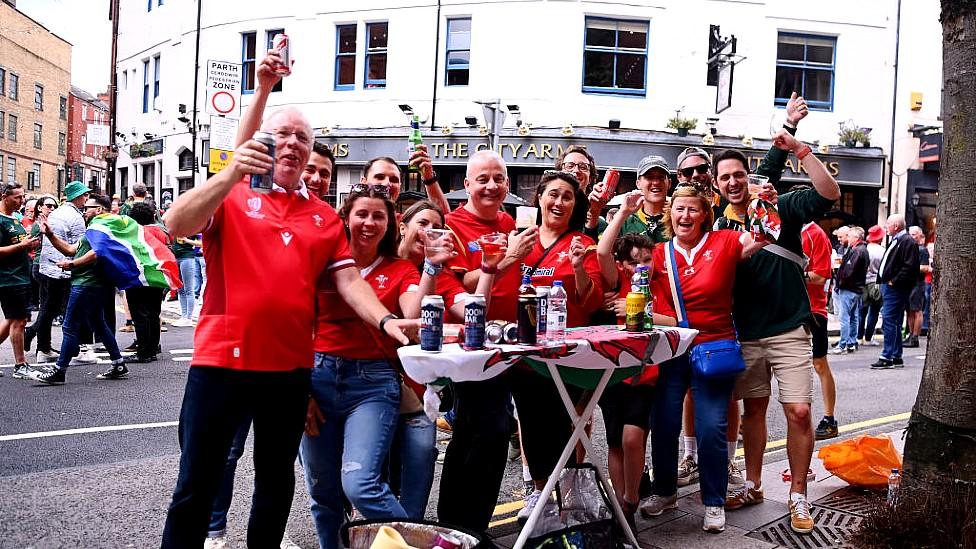
Match days in Cardiff are very popular, but this group brought their own drinks rather than visit a pub this summer
He acknowledges there are now far fewer traditional pubs, particularly in the city centre, but argues the industry is evolving.
"There's no doubt you're talking about societal changes, and one thing that stands out straight away is you see far more women in pubs and bars than you did back then and I think that's a very good thing," he said.
"I think it's been a very civilising aspect of what we do in our businesses.
"At its core, what we do is we serve customers, whether we serve them with drink, or food and drink, or food, drink and entertainment," he said.
"The thing at the moment is participation. You've got a couple of indoor golf ranges in Cardiff city centre, which I find extraordinary but I also find it great."
However, he believes there will always be a place for "the few traditional pubs that we've got left", adding: "I would never want to see that go because it's part of the heritage of the country."
'It's the way forward'
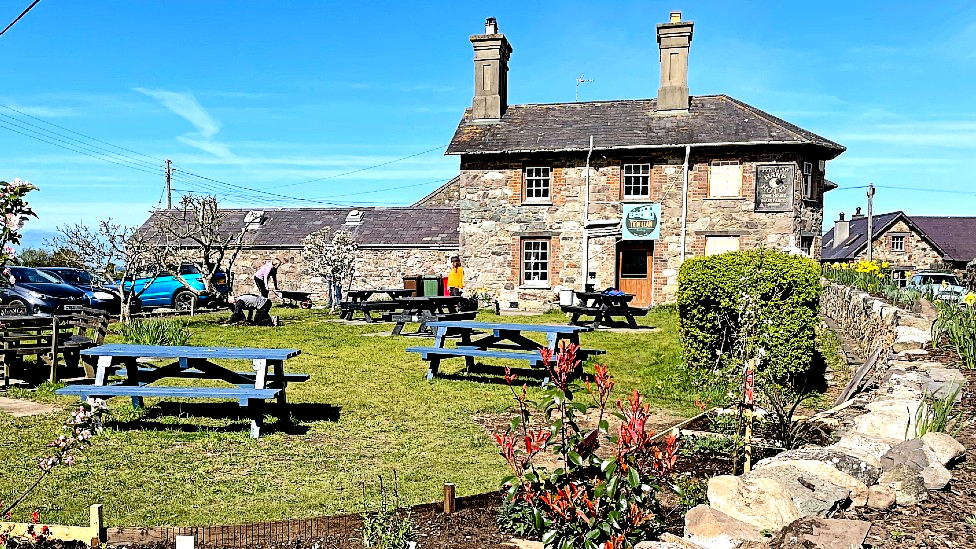
Ty'n Llan in Llandwrog, Gwynedd, closed for four years before local residents reopened it
A city centre would expect to maintain a pub industry in some form, but how are more rural venues faring?
One village saw its only pub close after the owner wanted to sell but couldn't find a buyer.
Ty'n Llan in Llandwrog, Gwynedd, was shut for four years until locals set up a community benefit society to buy it themselves and reopened it in 2021.
Two years on, Wyn Roberts of Menter Ty'n Llan, which manages the pub, has seen first-hand how pubs in places like Llandwrog - with a population 300 and one school, church and pub - have to move beyond just serving food and drink in order to thrive.
"Because Covid happened, people realised how important having somewhere to go [was], not just for a beer, just for a chat and to get together in one place," he said.
Wyn remembers the pre-closure pub as a popular place for food and drink and, while it still offers those things, it now goes further as a community-owned resource.
"I think it's the way forward for lots of pubs because they're not massive money-making opportunities like maybe they were years and years ago," he said.
"Pubs have to reinvent themselves as more community hubs."
Ty'n Llan has a range of clubs, including reading, Welsh learners, youth club, walking and French with Spanish in the pipeline too
'It's more alarming now than ever'
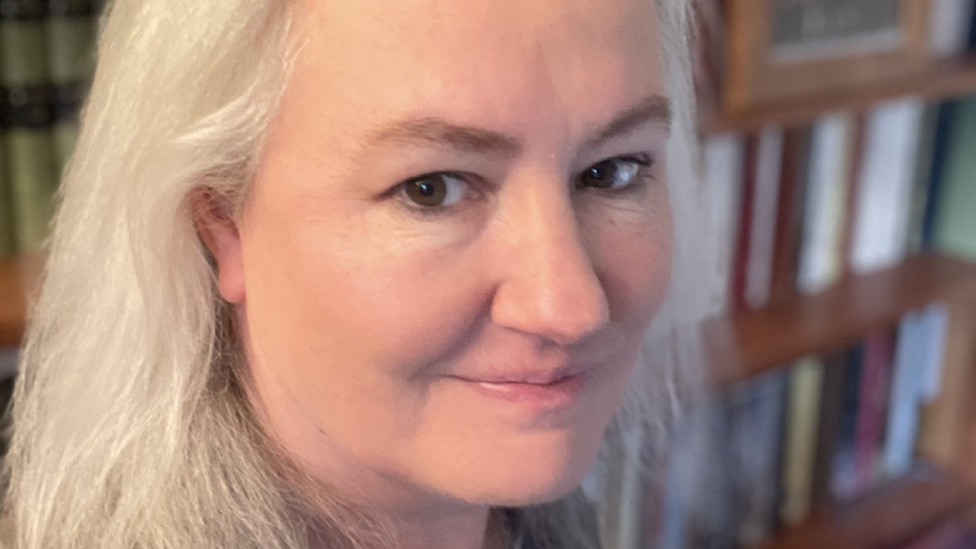
Llanidloes historian Nia Griffiths remembers about 15 licensed premises in the town when she was a teenager
Back in the day, Llanidloes in Powys had an embarrassment of riches on the pub front.
An official market town since 1280, its timber-framed Old Market Hall opened between 1612 and 1622 where the famed flannel made locally was traded.
All this trade made for thirsty work. The diminutive town, current population circa 3,000, had so many watering holes - up to 26 at one time - the local gentry had the town hall built as a temperance hotel so farmers would have somewhere to meet away from the temptations of drink.
World War One, combined with Nonconformist disapproval of drink, provided a "convenient excuse" to close a few down but the pubs were still thriving late into the 20th Century.
Historian Nia Griffiths, 54, is writing a book about Llanidloes's pubs and remembers in the 1980s there were still 11 pubs and three other places like the rugby club, plus a night club, but now it is down to "maybe four or five".
"It's more alarming now than ever."
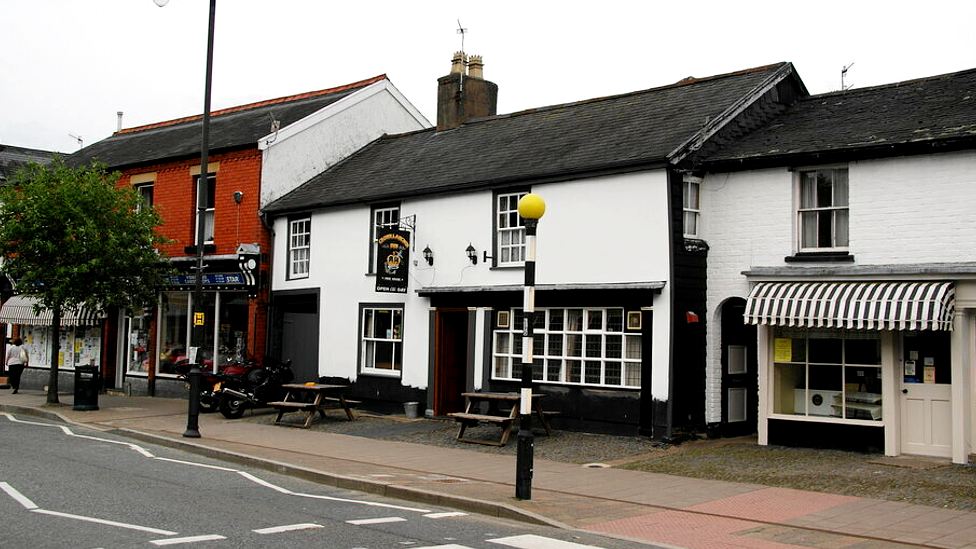
The Crown and Anchor in Llandiloes, pictured in 2011, has long been a fixture in the town
The most recent pub to shut is the Campaign for Real Ale -listed Crown and Anchor, external which is housed in an 18th Century building.
"It's quite a high profile closure… because it's a noted, heritage pub. It's on one of [Camra's] top lists of the most precious type of pub to preserve because its interior is quite historic, small rooms and what have you, said Nia.
As with Ty'n Llan Llandwrog, a group in Llanidloes is trying to gauge interest in opening it as a community-owned venture.
Nia has seen a change in the makeup of the high street in recent times with more coffee shops and cafes opening and "more emphasis on that than your old-fashioned pub".
At a talk she gave about Llanidloes's pubs, she said it was mobbed, ironically, because "everybody loves pubs" even though "nobody was in them that night".
"So people want something to do in the evening. They might just not want to go and sit in an old man's pub."

PARANORMAL: Chilling ghost stories and words appearing on the walls...
BLACK MUSIC WALES: The artists who pioneered black music in Wales

Related topics
- Published18 September 2023
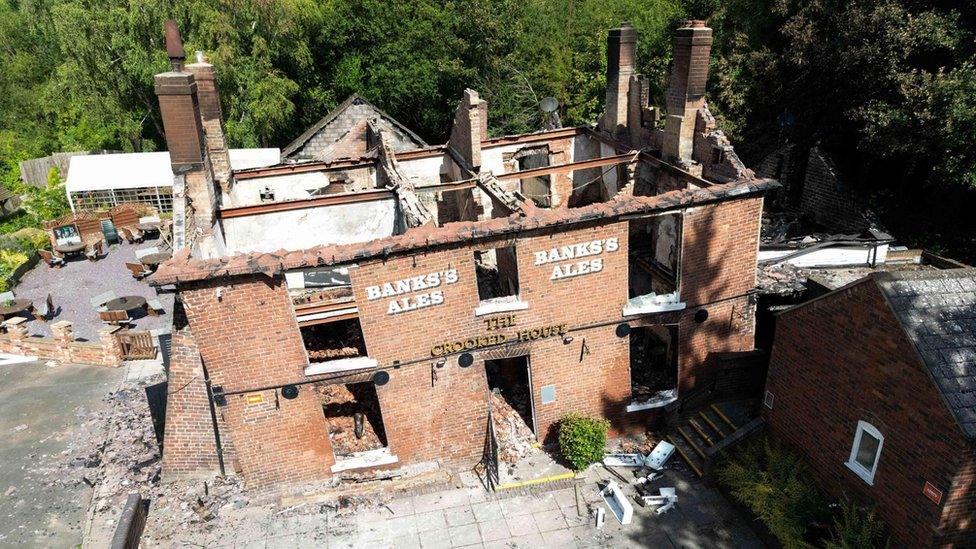
- Published12 June 2021
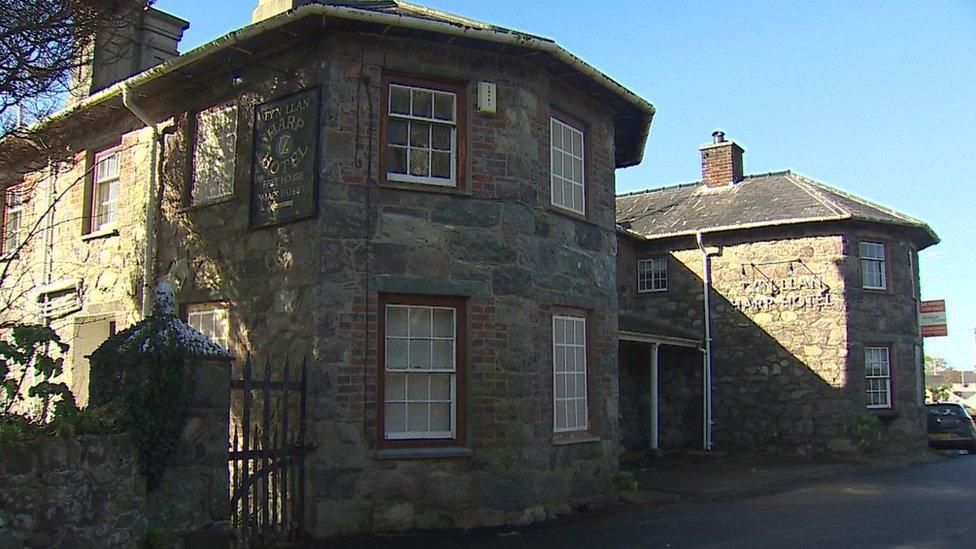
- Published13 July 2023

- Published26 October 2019